Multi-department management software – Front Office, Accounting, Housekeeping: The centralized operation solution
Imagine a busy morning at your hotel: the phone keeps ringing, the front desk staff are rushing to check in a large group, while the housekeeping team is hurrying to clean rooms and manually update room status. In another corner, the accounting team struggles with dozens of Excel sheets to reconcile last night’s revenue. Everyone is working hard, yet the departments seem to operate in silos — disconnected, unsynchronized. The result? Mistakes still happen, guests have to wait, and the manager constantly operates in “firefighting mode.”

This is not an uncommon scenario. In fact, it’s a major challenge many hotels face in the digital era. Today’s customers expect speed and convenience — they won’t tolerate waiting ten minutes to check in or having to repeat personal information multiple times. To meet those demands, centralized multi-department hotel management that removes data and process barriers is no longer optional — it’s essential for survival.
📌 Learn more about the CIT Hotel Resort Management Software – A comprehensive solution for the modern hospitality industry: See here
Current state of multi-department hotel management: The challenge of “data islands”
Operational fragmentation is a systemic problem. It originates from each department using separate tools or processes, creating “data islands” that can’t communicate with one another.
1. Data fragmentation & manual workflows
- Front Desk: Booking data from multiple sources (OTAs, website, direct bookings) aren’t synchronized in one place. Staff have to enter data manually, leading to overbooking or inaccurate guest information.
- Housekeeping: Room cleaning and inspection processes rely mostly on paper logs or phone calls. Room status updates are delayed, so front desk staff don’t know exactly when a room is ready for new guests.
- Accounting: Revenue and expense reports are compiled manually from vouchers, invoices, and Excel sheets. Reconciling transactions becomes complex, time-consuming, and prone to data loss.
- Management: Lacks real-time visibility. Decisions are often made based on outdated reports that don’t reflect the hotel’s current business situation.
2. Common difficulties by department
| Department | Common Issues | Direct Consequences |
|---|---|---|
| Front Desk | Duplicate data entry; delayed room status updates | Guest waiting; negative feedback; lost sales opportunities |
| Housekeeping | Not notified promptly when guests check out | Slow room turnover; unready rooms; reduced efficiency |
| Accounting | Manual reporting; data mismatches | Inaccurate financial statements; reduced credibility |
| Management | Disjointed data; delayed reports | Slow decision-making; wasted resources; reduced profit |
Table: Common daily challenges in the “traditional” hotel model.
Centralized operation solution: Building a unified “brain”
To address the root cause, TheApp4U has developed a centralized hotel management system that acts as the hotel’s “brain.” This solution is more than just software—it’s an integrated platform connecting all activities from front desk to housekeeping to accounting, ensuring synchronization and instant efficiency.
How the software works
Our software creates a seamless, continuous data flow across departments.
- Input data: All information from bookings, check-ins, check-outs (Front Desk), to room cleaning status (Housekeeping), and financial transactions (Accounting) are entered into the system.
- Instant synchronization: Data is processed and updated in real time on a single cloud-based platform.
- Comprehensive dashboard: All information is displayed on an intuitive dashboard, allowing managers to grasp the situation instantly and make quick, accurate decisions.
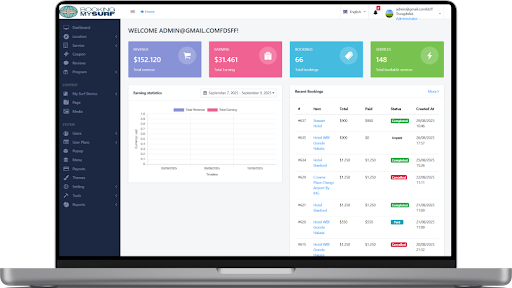
Real-world experience by role: When everything becomes easier
Let’s see how daily hotel operations transform when all departments are connected.
1. Front Desk: Check-in in just 30 seconds
Previously, front desk staff had to ask guests for information, look up records manually, and enter them into a computer — taking 5–10 minutes per guest. With TheApp4U’s software, all guest data is already synchronized from the booking channel. Staff only need to verify, scan the ID, and assign the room. The system automatically updates the room status as “occupied,” eliminating any confusion.
Example: A tour group of 10 guests arrives simultaneously. Instead of processing each guest one by one, the front desk can check in the entire group with just a few clicks. Meanwhile, the system automatically alerts housekeeping that 5 rooms are ready and the remaining 5 need urgent cleaning.
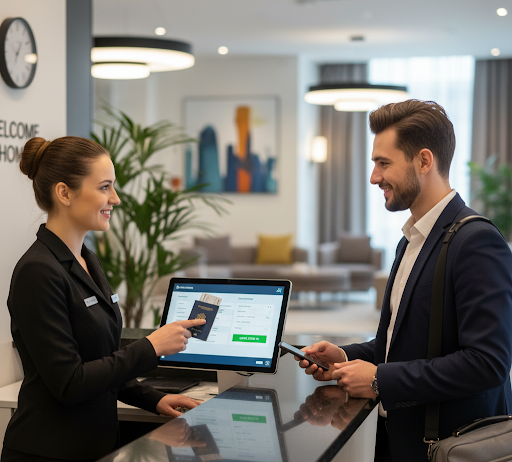
2. Housekeeping: Manage tasks via mobile app
No more running around or calling to check room status. With TheApp4U’s mobile app, housekeeping staff receive instant notifications when guests check out. They can update room status to “cleaning in progress” or “ready” with a single tap. This optimizes their schedule and ensures rooms are always ready for the next guests as quickly as possible.
3. Accounting: Automated and accurate financial reports
This department benefits the most from digitization and data centralization. Every transaction—from procurement costs to room revenue—is automatically recorded. Our software not only generates financial reports but also provides in-depth analysis of cash flow and profit margins by day, month, and sales channel. Instead of spending hours compiling monthly summaries, accountants can now generate precise revenue, cost, and profit reports with a single click. Data from OTAs and restaurant POS systems are integrated automatically, eliminating manual entry errors entirely.
4. Management: Real-time dashboard and multidimensional insight
Managers no longer have to wait for end-of-day or weekly reports. TheApp4U’s dashboard provides a real-time overview of all hotel operations.
You can monitor current occupancy rates, revenue by source, daily expenses, and even guest reviews from online platforms—all on one screen. This data empowers strategic decisions, such as launching promotions during low occupancy or adjusting room rates to maximize profitability.
→ Thanks to these features, hotels can operate efficiently while monitoring every activity from a single system.
Comparison: Traditional vs. Centralized Management
| Criteria | Traditional Management | Centralized Management |
|---|---|---|
| Check-in time | 5–10 minutes/guest | < 1 minute/guest |
| End-of-month reporting time | Dozens of hours; error-prone | A few minutes; highly accurate |
| Data error rate | Human-dependent; high | Near zero thanks to automation |
| Management visibility | Outdated, fragmented reports | Real-time dashboards, anywhere |
| Guest satisfaction | Frequent complaints due to delays | Improved thanks to fast, professional service |
Comparison table: Traditional vs. centralized hotel management.
ROI & Business Impact: More than just cost savings
Investing in a multi-department management solution and centralized operations is not merely an expense—it’s a sustainable investment that delivers clear, long-term returns.
1. Short-term financial benefits
- Reduced staffing costs: Automation lightens workloads and optimizes workforce allocation, saving 15–20% in payroll expenses.
- Minimized losses: Automatically recorded and accurate financial data reduces revenue leakage from internal transactions.
2. Long-term financial benefits
- Increased revenue: Faster, more professional service enhances guest satisfaction, boosting repeat visits and referrals by 10–15%. Effective revenue management can also raise average room revenue by 5–10%.
- Resource optimization: The software identifies main revenue streams and unnecessary costs, allowing smart reductions that save 20–30% in annual operating expenses.
- Enhanced brand value: A hotel that operates efficiently and professionally builds lasting trust and reputation among customers.
5 Tips for successful multi-department software implementation
Rolling out new software isn’t a “plug and play” process. To maximize results, a clear strategy is required.
- Thorough staff training: No matter how advanced the software, people must know how to use it. Ensure all staff are trained properly and understand the system’s benefits.
- Clear role-based access: Assign access permissions per role (front desk, housekeeping, accounting) to secure data and limit visibility to relevant information only.
- Start small: For larger hotels, test the software with one department or branch first before full rollout.
- Choose software with Vietnamese language support: Ensure your team faces no language barriers. TheApp4U provides a Vietnamese interface and localized support for domestic users.
- Leverage vendor support: Collaborate closely with TheApp4U’s implementation team for strategic consultation and timely issue resolution.
Implementation process at TheApp4U
Many hoteliers worry that implementation will be complex and disruptive. In reality, TheApp4U has standardized a 6-step process to ensure fast – smooth – zero-downtime deployment.
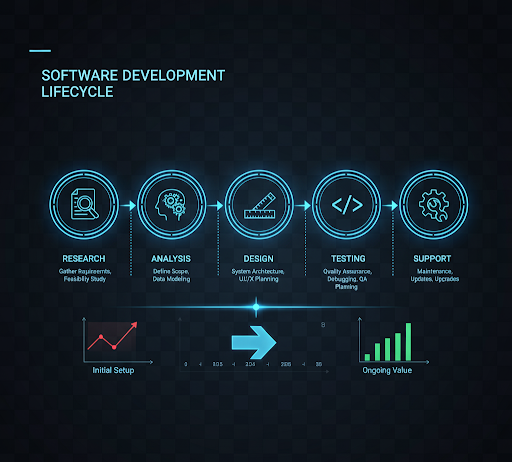
-
Survey & Requirements Gathering
- Collaborate with hotel owners and departments (front desk, housekeeping, accounting).
- Record current processes and identify pain points.
-
Analysis & Planning
- Define feature scope.
- Estimate time and cost.
-
UI/UX Design
- Minimalist, user-friendly interface.
- Prototype demo for feedback.
-
Development & Integration
- Core modules (booking, housekeeping, reporting).
- Integrate OTA, CRM, and payment systems as needed.
-
Testing & Deployment
- Run simulations with sample data.
- Pilot test on-site for 1–2 weeks.
- Official go-live.
-
Training & Post-deployment Support
- Train front desk and management staff.
- Provide documentation + videos; 24/7 support.
Commitment & Post-deployment Support
Software deployment is just the beginning. What matters most is long-term partnership to keep hotel operations stable and sustainable.
- Training & Knowledge Transfer: Empower the front desk and management teams to master the system from day one.
- 24/7 Technical Support: Via hotline, email, and ticket system. Ensure zero operational downtime.
- Warranty & Maintenance: Depending on the service package, support lasts from 12–36 months.
- Scalability & Expansion: When you open new branches, the system can scale quickly.
- Security & Technology Updates: Ensures compliance with the latest standards.
⇒ With TheApp4U, you’re not just buying software — you’re gaining a strategic technology partner.
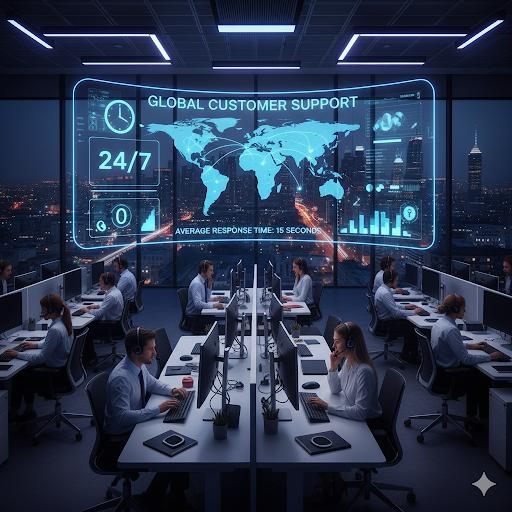
FAQs about Multi-department Management Software
To help you better understand the value and operations of a centralized management solution, we’ve compiled and answered the most common questions from hotel owners and managers.
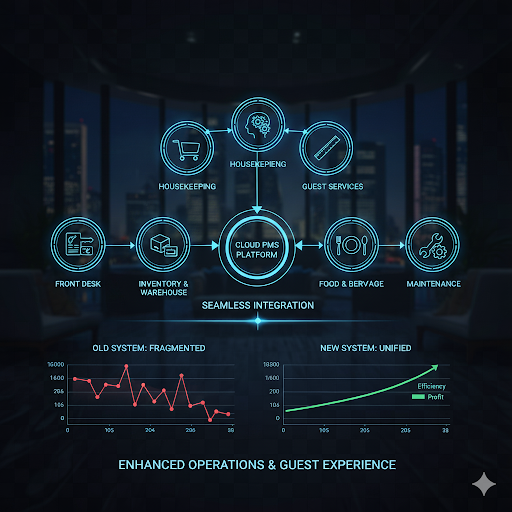
Operational transformation, future breakthrough — It’s time to act
In an increasingly competitive hospitality industry, technology adoption is no longer optional—it’s vital for survival and growth. Multi-department management software serves as the hotel’s digital backbone, unifying front desk, housekeeping, and accounting operations into a seamless, efficient workflow.
Investing in a centralized solution isn’t just about reducing costs or automating tasks. It’s a long-term commitment to enhancing guest experience, creating a professional work environment, and building a sustainable competitive advantage. From providing guests with smooth booking and check-in experiences to equipping management with deep business insights, the software’s role is undeniable.
Don’t let manual management complexity hold your hotel back. Take control and embrace transformation today!
👉 Register for a free demo: Experience the features and receive 1-on-1 consultation from our experts.
📞 Contact TheApp4U now to start your journey toward smart, modern, and efficient hotel management.

 English
English
 Tiếng Việt
Tiếng Việt
Add New Comment